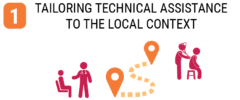How We’re Changing Our Approach to Ensure Mothers and Babies Reach Their Full Potential
Published on October 12, 2020

While progress has been made in helping women and children access essential, lifesaving health care over the past three decades, not all families have benefited equally from these gains. Women and children living in fragile settings and other vulnerable populations still face a disproportionate risk of death or disability compared to their counterparts.1
These challenges make it difficult for dedicated donors like USAID, governments, and local communities and organizations to reduce preventable maternal, newborn, and child deaths and increase access to voluntary family planning and reproductive health care. So how do we address this gap in care so that all women and children have the same opportunities to reach their full potential?
Improving the Way We Work
USAID has designed a new global health project, MOMENTUM, delivered through a suite of awards, to accelerate reductions in maternal, newborn, and child mortality and morbidity in 33 high-burden USAID partner countries.
MOMENTUM marks a strategic shift in USAID’s approach to maternal, reproductive, and newborn and child health care, by working with local organizations and governments to tailor solutions to better meet the needs of their communities. This ensures that countries can better respond to public health challenges, now and in the future, for the benefit of women, children, and families in greatest need.

In the past, USAID investments have contributed to improvements in the adoption and scale up of evidence-based maternal, newborn, and child health services, voluntary family planning, and reproductive health (MNCH/FP/RH) interventions and best practices. Yet new ways of working are required to effectively tackle some of the most intractable and systemic challenges that threaten the lives of mother and child. The COVID-19 pandemic makes this need even more critical. A recent article in the Lancet estimates that, under the most severe pandemic scenarios, monthly child and maternal deaths will increase up to 45 and 39 percent, respectively, in some countries, due to reduced coverage of childbirth interventions such as antibiotics for pneumonia, clean birth environments, and neonatal sepsis, and an increase in wasting prevalence.2
“Our vision is that all individuals will have equitable access to comprehensive, high quality maternal, newborn and child health; voluntary family planning; and reproductive health care that best meets their needs.”
Introducing New Approaches
To address these challenges, MOMENTUM has devised three new approaches to its work to better collaborate with countries, communities, and households to achieve and sustain optimal health for women and children:

This spans the humanitarian to development continuum. We partner with local institutions to increase the effectiveness of evidence-informed practices to promote health-seeking behavior and deliver MNCH/FP/RH care by adapting these practices to the local context.

We develop new public-private partnerships with local governments, academia, non-health entities, and commercial providers that will increase intervention reach and sustainability.

We address obstacles such as stagnating routine immunization rates among children and lack of access to safer surgeries for maternal and reproductive health.
Within each country, MOMENTUM equips communities and decisionmakers at all levels with data and skills to make informed decisions. This improves our ability to provide context-driven technical approaches appropriate for meeting the needs of priority populations, such as vulnerable adolescent girls and young women, first-time parents, and out-of-school youth.
Supporting the Journey to Self-Reliance
Now, more than ever, as countries around the world are combatting a global pandemic, it is essential that we ensure the continuity of essential health care for women and children. MOMENTUM will play a critical role in accelerating progress on preventing maternal and child deaths. This includes adopting more tailored approaches to help countries, governments, local health ministries, and communities overcome unique health challenges and build capacity and skills of their own so they may progress on their Journey to Self-Reliance.
References
- USAID. Acting on the Call report. https://www.usaid.gov/sites/default/files/USAID_2020_Horizontal_TAG_V12_508optV3.pdf
- Roberton T, Carter ED, Chou VB, et al. “Early estimates of the indirect effects of the COVID-19 pandemic on maternal and child mortality in low-income and middle-income countries,” Lancet. (May 12, 2020).

